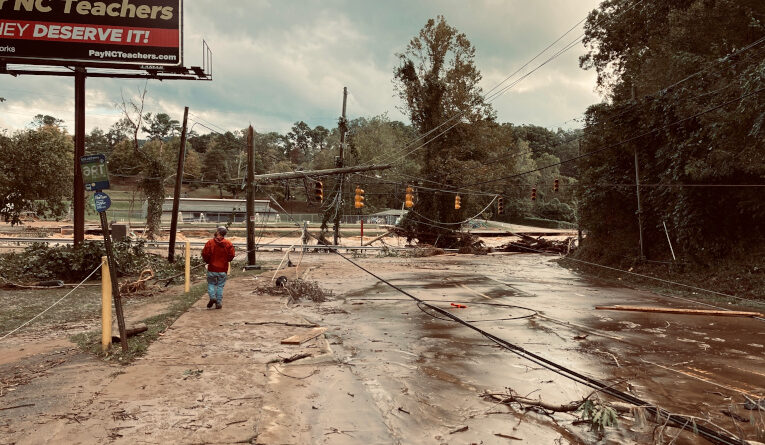Environment is Economics, Stupid.
If you choose to stay… you will die,” said the mayor of Tampa, Florida, two days before Hurricane Milton was predicted to make landfall—less than two weeks after Hurricane Helene ravaged the Bible from the coast to the summits of mountains. If there was ever a time to talk about the effects of global warming, it’s now—but not in the usual way.
Every election since James Carville said, “It’s the economy, stupid,” has been the economy.
However, Helene was one of the costliest hurricanes in United States history. Although still a prologue, Hurricane Milton won’t be far behind. The two storms affected “more than 200 counties involving 31 million people in six states.
Funding for the government’s two main disaster response agencies—FEMA (Federal Emergency Management Administration) and SBA (The Small Business Administration)—is unlikely to cover their relief responsibilities without larger shares. Political intervention in state disaster relief has made cooperation a challenge even when the need is evident and the time is critical.
The first damage estimate by AccuWeather is that Hurricane Helene caused between $225 and $250 billion in damages. The number is much higher than the initial estimates of some. It is also higher than previous hurricane cost estimates. Even more surprising is that insurance companies will only pay $6.4 billion to policyholders, according to AccuWeather’s forecast.
AccuWeather’s number is superior to many others because it reflects reality so well. Included in the organization’s statistics are:
- Costs of rebuilding homes, businesses, roads and infrastructure;
- Loss of income and economic productivity during the years-long reconstruction;
- Loss of life;
- Health care costs for storm survivors and first responders;
- The cost of prolonged power outages;
- Costs of major business interruptions and travel; and,
- Long-term losses in tourism, technology, renewable energy, and other industries.
AccuWeather estimates that Hurricane Milton will be responsible for between $160 and $180 billion in damages. According to the organization’s Executive Chairman, Joel N. Myers, the storms together will cause losses equal to 2 percent of the nation’s GDP.
Also, consider that the costs of weather-related disasters are not one-time events. Many people who thought that living in the mountains of North Carolina would protect them from a storm in the Gulf of Mexico or the Atlantic would not harm them are now afraid to live there—just like those on the coast are now those who migrate. of the lowlands.
Many who have seen their loved ones lose running water or electricity and a bridge cut because they could not get the necessary medicine or lack the electricity to run a dialysis machine will need years of counseling. It is also estimated that disaster areas will become ground zero for the epidemic of COVID and influenza.
There will be a lowering the value of buildings in many affected areas. There is widespread environmental damage to the factor. Tens of thousands of trees were uprooted by winds and rains, leading to loss of habitat and further erosion until new trees can do the old work. Lower real estate taxes mean lower income taxes.
Home insurance costs—even in areas outside of disaster paths—are rising as damage mounts and accumulates from one storm and wildfire to another. As of 2020, the total premium has increased by more than 30 percent. Where weather risks are high, so are premiums. In an increasing number of places, it is no longer possible to even get home insurance. Lenders have little visibility of unpaid assets.
When personal insurance is no longer availablegovernments will be called upon to be the insurer of last resort. In that case, taxpayers will bear the brunt. It’s not just insurance costs. It is also about reducing the amount of land that can be built on. Private insurers will not always pay to rebuild homes or factories in high-risk areas. What used to be one-hundred-year flood plains is now a land covered in water for an average of one to two years.
Eleanor Mueller reports the National Flood Insurance Program “will likely use up about $5 billion in program funds and force it to use $9.9 billion in Treasury borrowing power.” The costs of Hurricane Milton may require the Program to seek higher borrowing caps. What is guaranteed is that all taxpayers will be on the line for a decade or more – just to pay disasters so far.
The effects of global warming are not only the damage caused by winds, rains, and rising and warming seas. It also addresses drought and rising food production costs, competition between cities and farms for dwindling water supplies, deforestation and the northward movement of life-threatening insect diseases. the beauty and well-being of people, animals and plants. .
The message here is simple: The environment is economic, stupid.
A problematic message is best paired with a positive—and realistic—solution. There are great connections to be made between what makes sense in science and what makes sense and understanding. Climate change deniers have proven unwilling to accept the word of many of the world’s scientists. Perhaps the word insurance and investment brokers will be better tolerated.
There are strong bi-partisan arguments for rebuilding properly after climate-related disasters. The Infrastructure and Jobs Act was the only piece of climate-related legislation passed since Trump left office. It’s the kind of law that needs to be expanded to make communities – from the coast to the mountaintops – tougher and not repeat the mistakes of the past.
Even if Helene and Milton and the hurricanes, wildfires, and droughts of the past didn’t cost Americans all—the next ones will. The clean energy and environmental community needs to make economics the main topic of their arguments.
Teaser image credit: Damage in Asheville, North Carolina – at the intersection of Swannanoa River Road (NC-81) and Azalea Road – caused by Hurricane Helene. By Bill McMannis – https://www.flickr.com/photos/billmcmannis/54036533359/, CC BY 2.0, https://commons.wikimedia.org/w/index.php?curid=153484551
#Environment #Economics #Stupid
